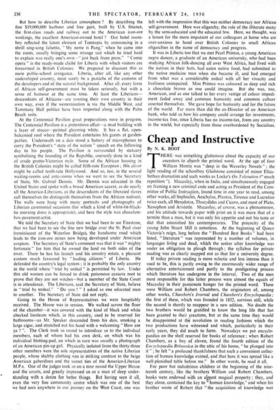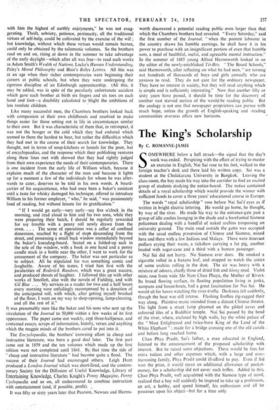Cheap and Instructive
By N. K. BOOT THERE was somf thing gluttonous about the capacity of our ancestors to absorb the printed word. At the age of four William Morris was "deep in the Waverley Novels " ; the light reading of the schoolboy Gladstone consisted of minor Eliza- bethan dramatists and such works as Locke's On Toleration (" much repetition "). Macaulay, when in India, and simultaneously engaged on framing a new criminal code and acting as President of the Com- mittee of Public Instruction, found time in one year to read, among other works, all Sophodes, Aeschylus, Plautus, Terence and Lucretius twice each, all Hero:lotus, Thucydides and Cicero, and most of Plato, Xenophon and Aristotle. Macaulay, of course, was a phenomenon, and his attitude towards paper with print on it was more that of a termite than a man, but it was only his appetite and not his taste or diet that astonished his contemporaries. The precocity of the young John Stuart Mill is notorious. At the beginning of Queen Victoria's reign, long before the "Hundred Best Books" had been listed, " literature " was represented by a number of volumes, in languages living and dead, which the seeker after knowledge was under an obligation to plough through ; the syllabus for private reading, was as clearly mapped out as that for a university degree. If today private reading is more eclectic and less intense than it used to be, this is partly owing to the enormously wider range of alternative entertainment and partly to the predigesting process which literature has undergone in the interval. Two of the men most responsible for this latter process were almost the equals of Macaulay in their passionate hunger for the printed word. These were William and Robert Chambers, the originators of, among other works, Chambeis's Journal and Chambers's Encyclopaedia ; the first of these, which was founded in 1832, survives still, while the second is shortly to reappear in a new edition. No doubt the two brothers would be gratified to know the long life that has been granted to their creations, but at the same time they would be disappointed at th'e revolution in reading fashions which the two productions have witnessed and which, particularly in their early years, they did inuch to form. Nowadays we put encyclo- paedias on the shelf reserved for books of reference ; when Robert Chambers, as a boy of eleven, found the fourth edition of the Encyclopaedia Britannica in .the attic of his home, "he plunged into it" ; he felt "a profound thankfulness that such a convenient collec- tion of human knowledge existed, and that here it was spread like a well-plenished table before me." In other words, he read it all.
For poor but industrious children at the beginning of the nine- teenth century, like the brother p William and Robert Chambers, books were endowed with an almost magical property ; they, and they alone, contained the key to " human knowledge," and when his brother wrote of Robert that "the acquisition of knowledge was
with him the highest of earthly enjoyments," he was not exag- gerating. Thrift, sobriety, patience, pertinacity, all the traditional virtues of self-help, could be cultivated by the exercise of the will ; but knowledge, without which these virtues would remain barren, could only be obtained by the talismanic volumes. So the brothers read on and on, rising at dawn in the slimmer to take advantage of the early daylight—which after all was free—to read such works as Adam Smith's Wealth of Nations, Locke's Human Understanding, Paley's Moral Philosophy and Blair's Belles Lettres. All this was at an age when their richer contemporaries were beginning their careers at public schools, but when they were undergoing the rigorous discipline of an Edinburgh apprenticeship. (All this, it may be added, was in spite of the peculiarly unfortunate accident which gave each brother at birth six fingers and six toes on each hand and foot—a disability calculated to 'blight the ambitions of less resolute children.
Like many successful men, the Chambers brothers looked back with compassion at their own childhoods and resolved to make things easier for those setting out in life in circumstances similar to their own But it was characteristic of them that, in retrospect, it was not the hunger or the cold which they had endured which seemed to them the hardest to bear, but rather the difficultizs which they had met in the course of their search for knowledge. They thought, not in terms of soup-kitchens or hostels for the poor, but of encyclopaedias, and the response which their publishing ventures along these lines met with showed that they had rightly judged from their own experience the needs of theif-contemporaries. There is one incident from the early life of William which, because it explains much of -the character of the man and because it lights up for a moment a few of the individuals for whom he was after- wards to cater, deserves to be told in his own words. A board- carrier of his acquaintance, who had once been a baker's assistant until a taste for whisky damaged his technique, offered to introduce William to his former employer, "who," he said, "was passionately fond of reading, but without leisure for its gratification."
"If I would go early—very early—say five o'clock in the morning, and cad aloud to him and his two sons, while they were preparing their batch, I should be regularly rewarded for my trouble with a penny roll newly drawn from the oven. . . . The scene of operations was a cellar of confined dimension, reached by a flight of steps descending from the street, and possessing a small back window immediately beyond the baker's kneading-board. Seated on a folded-up sack in the sole of the window, with a book in one hand and a penny candle stuck in a bottle near the other, I Went to work for the amusement of the company. The baker was not particular as to subject. All he stipulated for was something comic and laughable. Aware of his tastes, I tried him first with the jocularities of Roderick Random, which was a great success, and produced shouts of laughter. I followed this up with other works of Smollett, also with the novels. of Fielding, and with Gil Bias . . . My services as a reader for two and a half hours every morning were unfailingly recompensed by a donation of the anticipated roll, with which, after getting myself brushed of the flour, I went on my way to shop-opening, lamp-cleaning, and all the rest of it."
It was presumably men like the baker and his sons who sent up the circulation of the Journal to 50,000 within a few weeks of its first appearance. The paper came out weekly, coat three-halfpence, and contained essays, scraps of information, history, verses and anything which the magpie minds of the brothers cared to put into it.
The Encyclopaedia, the brothers' browning effort in cheap and instructive literature, was born a good deal later. The first part came out in 1859, and the ten volumes which made up the first edition were not completed until 1868. By, that time the tide of "cheap and instructive literature" had become quite a flood. The success of their Journal had encouraged , others. Leigh Hunt produced a London Journal which was short-lived, and the contem- porary Society for the Diffusion of Useful Knowledge, Library of Entertaining Knowledge, Charles Knight's Penny Magazine, Penny Cyclopaedia and so on, all endeavoured to combine instruction with entertainment (and, if possible, profit). I It was fifty or sixty years later that Pearson, Newnes and Harms- worth discovered a potential reading public even 'larger than that which the Chambers brothers had revealed. "Every Saturday," said the first number of the Journal, "when the poorest labourer in the country draws his humble earnings, he shall have it in his power to purchase with an insignificant portion of even that humble sum, a meal of healthful, useful, and agreeable mental instruction." In the summer of 1885 young Alfred Harmsworth • looked in on the editor of the newly-established Tit-Bits. "The Board Schools," said Harrnsworth, after reflecting on what he had seen, "are turning out hundreds of thousands of boys and girls annually who are anxious to read. They do not care for the ordinary newspaper. They have no interest in society, but they will read anything which is simple and is sufficiently interesting." Now that another fifty or sixty years have passed, it should be time for the discovery of -another vast starved section of the would-be reading public But the analogy is not one that newspaper proprietors can pursue with much hope, unless the growth of English-speaking and -reading communities overseas offers new horizons.



































 Previous page
Previous page